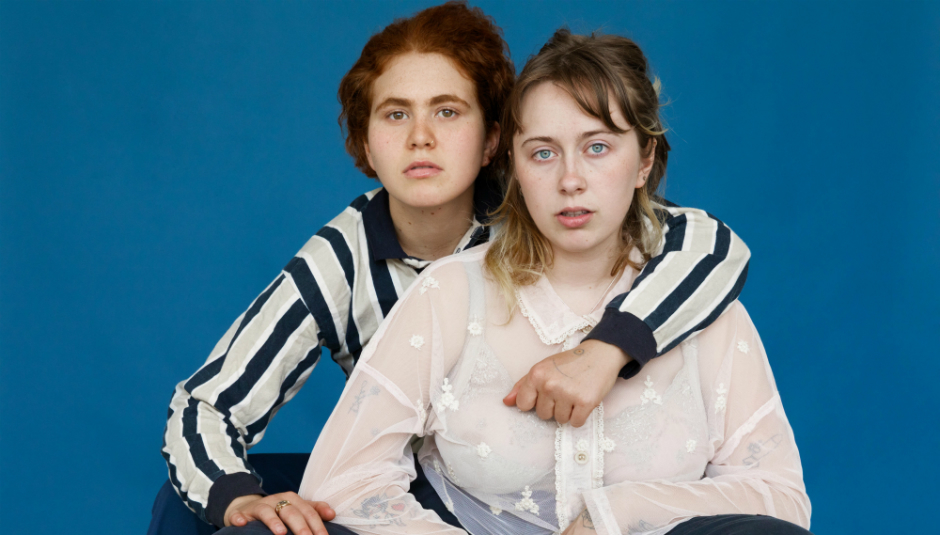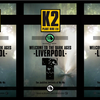On their second album Powerplant, Girlpool expand their sound from their previous minimalistic guitar, bass and two voices to a full band, with themes and imagery that carry a sense of having grown up in tandem with their sound. We chatted to them about their development as a band, to Cleo about the nature of queerness and their relationship to it, and other ideas behind their fluid music and the equally fluid nature of Girlpool.
DiS: So I guess we’ll start with the question you’re probably sick of hearing: your new album sounds different! Was that much bigger sound a conscious decision, a natural next step?
Harmony Tividad: Yeah! We wanted to explore what we could do with the space in the songs that we had written. We had all the songs mostly done and were curious where we could take them. So we just filled them out a bit, and they feel really good.
They sound really good. When did you decide to have drums? That’s new.
HT: Right before we recorded last July or June, we decided to play with expanding the sound a bit more. ‘Cause we’d both make recordings of songs we’d written separately with drums and percussion and stuff, and were curious how Girlpool would be with it.
So Before The World Was Big was very beautiful in its closeness, and also in its themes of growing pains. What (if anything) would you say was your overarching theme in Powerplant?
HT: I don’t know, I feel like we were just writing about what was going on and what felt real to both of us, and it just ended up being this exploration of the inner relationship with oneself and outer relationship with the world, and people...it’s a mix of that I think.
I really like the relationship stuff particularly. ‘123’, I think, is the first song I’ve heard from Girlpool to be explicitly about queerness. Was that a deliberate decision like, “We wanna do a song about this”?
HT: I’m gonna pass this to Cleo.
Cleo Tucker: Hmm, I think that’s an interesting question because I feel like queerness is like everything about me; I don’t think it’s just my gender, or just my sexual orientation, but a queer way of life, I think, spills into everything I create and my way. It’s like a way of thinking that I feel like. And I guess that’s fully encompassed in everything that I pour myself into, my queerness.
So the nature of queerness is such that it’s always a part of your life and thus always a part of something you create then, whether central or incidental?
CT: When I talk about queerness, it’s not about sexuality - it’s a way of thinking, it’s thinking queerly, living queerly, it’s rejecting the societal structures from your identity, not allowing them to further inform your way of life. So yeah.
Is that largely what the video was about too then?
CT: Not really, I don’t think we have a “queer song”. ‘123’ isn’t the queer song. The video was more about an interaction with love and toxic relationships.
I really loved the beauty in that pain that was so visible in that video, with the paint as blood etc. Was that something you came up with to express directly how that feels?
CT: I came up with that idea with my friend Nick who directed the video. We were talking about not acknowledging certain things, and we thought capitalising on the pain, the hardships in a relationship that are just ignored because it’s easier that way. I thought capitalising on it in an obnoxious green blood in an over the top way was cool, because it’s so obviously there but never recognised, never acknowledged, no-one’s weirded out by it, you know? Other than yourself in the mirror, for like a second. But then she’s like very casual.
I loved the various explorations of relationships in Powerplant, like I was saying. Did that come from both of you?
CT: Yeah, both Harmony and I have had various types of relationships with people in the past couple years that have informed Powerplant for sure.
I loved the line “You’ve got lots of potential / Can you feel it?” Was that inspired by a relationship too?
CT: I mean, we meant that line about, can you feel your fullness? Nothing other than that. I don’t even think we even thought about the way that line sounds in that way, we just liked the words “can you feel it?”, about your potential. Just very literal.
So it’s more of a realisation of your own potential in yourself? It’s more empowering to the listener in the mirror.
CT: Right.
Is self-empowerment and self-love something that’s very crucial to you guys?
CT: I think that’s just being a human, feeling small, struggling, and caring about somebody, and wishing they could realise their fullness, that they’re worth it, infinite, special, beautiful. I think that’s love, and so it’s totally important to us, even though we’ve never decided that. I think Harmony and I are both very passionate, emotional human beings.
It comes through in your music. I’m interested in how so many of your songs could be taken by people as their anthem for a particular time, feeling, or event in their lives, yet you’re resistant to labelling your songs like, “That’s the queer song, that’s the self-love song, that’s the growing up song”, so I’d be interested in talking about your writing process a bit, and how your songs come to be?
CT: First though I just wanna reiterate that there’s no queer song, ‘123’s not a gay song. It’s just a song that I wrote and I am queer, but that’s in no way how I want it to be perceived. The whole point of being queer is not to be categorised.
Oh totally.
But yeah, I guess our writing process has changed a little bit over time, but we write a lot together, we write words a lot together, we spend a lot of time communicating about a thought, about words and shit. And when we write separately, we’re always sending them to each other. I guess there’s really no rubric to it, it’s just naturally how Harmony and I work together. There’s no specific step to it at all really, it’s just an open space for me and Harmony to write and discuss whatever’s on the surface for us at the moment.
That makes a lot of sense, in particular with When The World Was Big and your earlier work in mind. The riffs between the two of you have always felt very communicative, they seem like they’re in a dialogue, working together. Were they all written together?
CT: Yeah, I wrote ‘I Like That You Can See It’, and that was the only song where we wrote separately. The rest we wrote together.
So when I saw you in London, you guys swapped instruments at one point. Do you both create on both instruments?
CT: Yeah, there are a couple songs we have where I play bass and Harmony plays guitar. I play drums too, I wrote some drum parts for the record. It’s just totally fluid, like if Harmony and I feel inclined to play piano on a Girlpool song, we would want to, there’s nothing wrong with experimenting.
Totally, and there’s a bit of piano on ‘Powerplant’ isn’t there?
CT: There’s a lot of piano on ‘Powerplant’! And there’s xylophone and stuff...it was cool to use that stuff from the studio.
Did the drum stuff exist before you went into the studio then?
CT: Yeah we made these demos, and I recorded drums on all of the songs, and then I emailed them to our friend Miles, who was able to play them quickly in the recording. So we were able to make the album pretty fast.
Before The World Was Big was very much about growing up, while Powerplant’s themes are generally much more present. Was the development of this bigger sound directly related to the thematic one, or just another natural next step?
CT: Honestly it’s hard to know. It’s like when you come downstairs in the morning and your parents say you look taller, but you look at yourself in the mirror every day and you don’t know what they’re talking about. It’s just kind of like...what felt good. Harmony and I have grown, naturally, and our lives move on with time, and then we made this album together. So yeah...I guess that makes sense.
So what inspired you to name the album Powerplant?
HT: We just felt like it encapsulated a lot of different ideas and thoughts. Because it’s such a loaded word that has so many connotations, it seemed like an exciting choice for what we wanted to communicate. Just because a powerplant is both a physical object, that represents this industrial idea of mass production, but also that could be perceived as something more romantic, and more emotional. It’s an interesting thing to grapple with.
So when you play this material on tour will it be with a full band or stripped back versions
HT: It’ll be a full band, we have a second guitarist as well.
Does that feel like that’s what Girlpool “is” now?
HT: I feel like Girlpool is me and Cleo writing songs together, and the live performance of it can be anything from the two of us to twenty of us, in that it’s a very fluid thing.
With your friendship at the heart of it.
HT: Totally.
Powerplant is out now via Anti Records. For more information about Girlpool, please visit their official website.






















